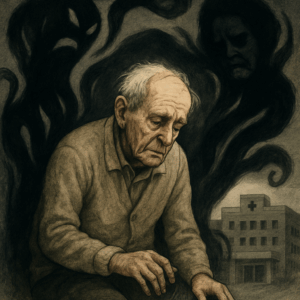Parkinson’s Disease Beyond Tremors: Depression and Psychosis in the Spotlight
 A Case to Begin With
A Case to Begin With
Mr. S, a 64-year-old retired engineer, was diagnosed with Parkinson’s disease (PD) five years ago. His tremor and stiffness were well-controlled with medications. But over the past year, his wife noticed worrying changes: he grew withdrawn, stopped engaging in his favorite crossword puzzles, and often said life felt “pointless.” More recently, he described seeing children playing in the living room when none were there.
This story is not unusual. While Parkinson’s is famous for tremors and slowness, neuropsychiatric symptoms like depression and psychosis often cause more disability than the motor symptoms themselves.
Why Parkinson’s Affects the Mind
-
PD results from degeneration of dopamine-producing neurons in the substantia nigra.
-
Dopamine, serotonin, and noradrenaline circuits are involved not just in movement but also in mood and perception.
-
Medications used to treat PD (dopamine agonists, anticholinergics, selegiline, amantadine) can sometimes worsen hallucinations or mood symptoms.
Depression in Parkinson’s Disease
-
Prevalence: 20–40% of PD patients.
-
Features: low mood, loss of interest, pessimism, fatigue, sleep disturbance.
-
Why tricky to spot: psychomotor slowing and masked facial expression can mimic depression.
Management:
-
Medications: SSRIs (sertraline, escitalopram), SNRIs (venlafaxine, duloxetine), TCAs (nortriptyline – effective but side effects).
-
Therapies: CBT, exercise programs, occupational therapy.
-
Other options: ECT in severe, refractory depression.
Psychosis in Parkinson’s Disease
-
Prevalence: up to 40% with disease progression.
-
Features: visual hallucinations (commonest), paranoid delusions, illusions.
-
Causes: disease progression, dopaminergic drugs, sleep disturbance.
Management:
-
Review medications: taper or stop offending agents (anticholinergics, dopamine agonists, selegiline) before reducing levodopa.
-
Antipsychotics:
-
Clozapine: most effective, no motor worsening, but requires blood monitoring.
-
Quetiapine: widely used, easier monitoring, variable efficacy.
-
Pimavanserin: newer option, selective 5-HT2A inverse agonist (does not worsen motor function).
-
-
Avoid: risperidone, haloperidol, olanzapine — worsen parkinsonian symptoms.
Impact on Caregivers
-
Depression in PD increases caregiver stress and burden.
-
Psychosis can strain relationships and sometimes lead to institutionalization.
-
Family education is essential: these are brain-based symptoms, not character flaws.
Key Takeaway
Parkinson’s disease is more than just tremors. Depression and psychosis are part of the illness, not just side effects or aging. Recognizing and treating these symptoms early can dramatically improve quality of life for patients and families alike.
About the Author
Dr. Srinivas Rajkumar T
Consultant Psychiatrist
Apollo Clinic, Velachery, Chennai
📞 85951 55808
Dr. Srinivas writes at srinivasaiims.com, where he shares insights on psychiatry, neuropsychiatry, and mental health awareness for students, clinicians, and caregivers.